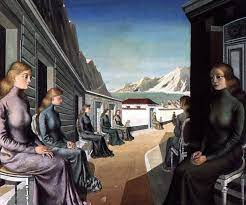
I read, and I learn. I may not always like or even USE what I learn, but learning is learning.
For Exhibit A, I give you the rather wonderful book Plainwater by Anne Carson. A mix of poetry and essays, it offers up an incisive creativity that looks at the world in new ways (the job description for every writer, I’d venture).
The 1995 book is divided into five sections (this from the inner flap): “Mimnermos: The Brainsex Paintings, a present-day dialogue with a poet of the seventh century BC; Short Talks, one-minute lectures on topics as diverse as trout and Parmenides; Canicula di Anna, a chronicle of a phenomenology conference conducted in Perugia, Italy; The Life of Towns, verbal photographs that capture the essence of the nearly extinct ‘town’; and The Anthropology of Water, a travelogue of three moments in the journey of a woman’s life.”
While I reveled in each section of the book, it was the poetry of The Life of Towns that taught me something. Something I may never use, yes, but something.
Carson introduces this section with the words, “Towns are the illusion that things hang together somehow, my pear, your winter.”
Well, shoot. You could probably substitute most any word for “Towns” in that sentence and get somewhere, but the pear/winter dichotomy gives you an indication of where Carson’s mind wanders.
What she does in the town poems is capitalize the first word of each line and then end each line with a period. Even if it’s not the end of a sentence. And it usually isn’t. This technique gives the poems a remarkable effect. Let me share a few by way of example:
Town of Spring Once Again
“Spring is always like what it used to be.”
Said an old Chinese man.
Rain hissed down the windows.
Longings from a great distance.
Reached us.
September Town
One fear is that.
The sound of the cicadas.
Out in the blackness zone is going to crush my head.
Flat as a piece of paper some night then.
I’ll be expected.
To go ahead with normal tasks.
Mending the screen.
Door hiding my.
Brother from the police.
Luck Town
Digging a hole.
To bury his child alive.
So that he could buy food for his aged mother.
One day.
A man struck gold.
Town of the Sound of a Twig Breaking
Their faces I thought were knives.
The way they pointed them at me.
And waited.
A hunter is someone who listens.
So hard to his prey it pulls the weapon.
Out of his hand and impales.
Itself.
Town of the Death of Sin
What is sin?
You asked.
The moon stung past us.
All at once I saw you.
Just drop sin and go.
Black as a wind over the forests.
At first, of course, this capital-period, capital period tick-tock annoyed me. Why couldn’t Carson just write it correctly, I wondered? If I wanted to fully appreciate her poems, I had to work for it. But I didn’t want to work. I was the reader, after all. It was the writer’s job to do the heavy lifting, and mine to sit back and enjoy.
But then, not wanting to miss the show, I rolled up my sleeves and set to work. And I do mean work. I slowed down. I back tracked. I lingered word by word. It became a game–one I could win if I gave it the effort.
In short, whether it was her intention or not, Carson had me reading and rereading with care, puzzling her words and sentences together until we came to mutual agreement on each poem’s meaning and worth.
Could there be more to it than that? Perhaps. But I know this: a poet has at his or her disposal more simple tools than we expect to slow spoiled and entitled readers like me down.
And if you don’t.
Believe this.
It’s perfectly.
Fine by.
Me.








